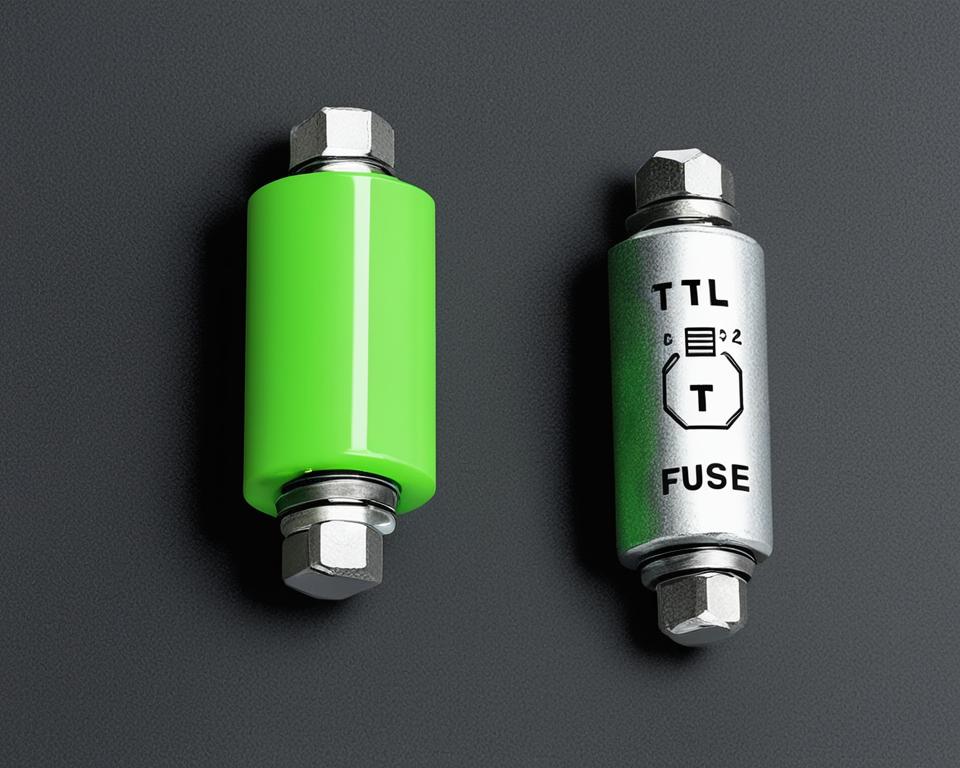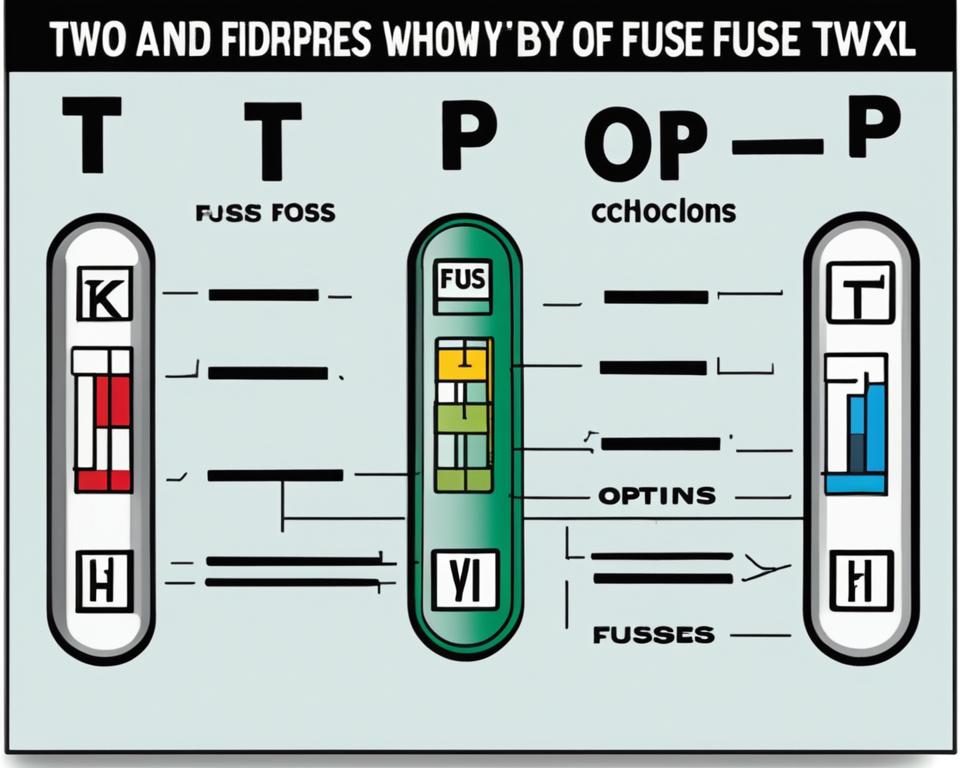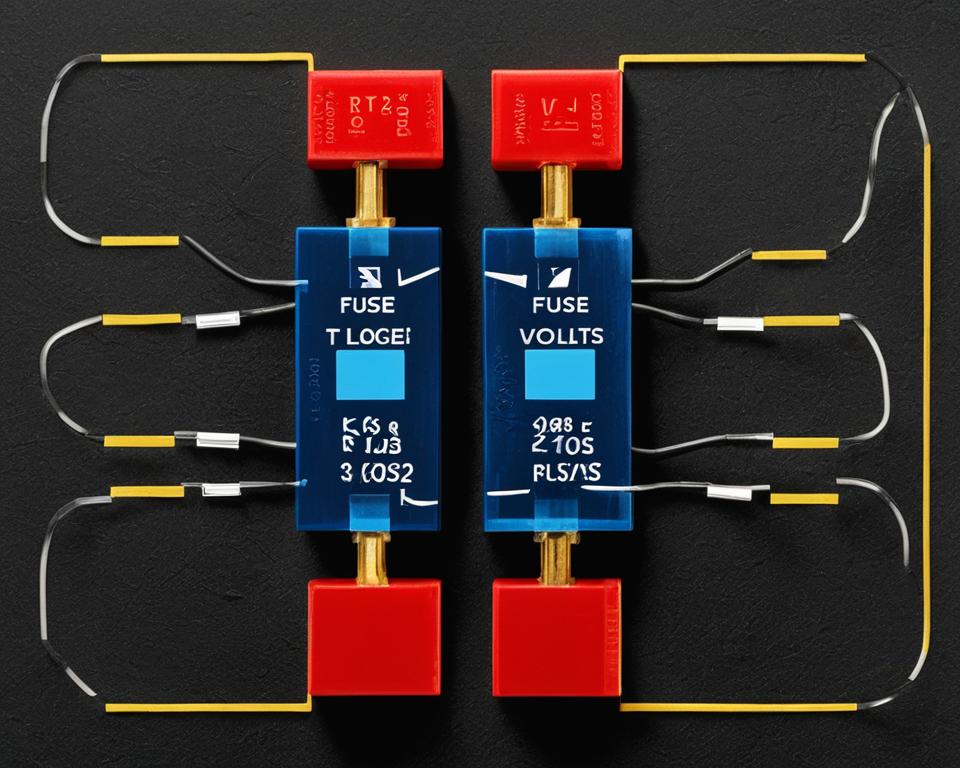When it comes to electrical fuses, there are various types available to protect circuits from overloads. Two common types are T and TL fuses. Understanding the differences between these fuse types is essential for proper fuse selection and electrical safety.
T fuses have an Edison base and can fit into any Edison socket, regardless of the circuit’s amperage. On the other hand, TL fuses have a rejection base and require an adapter base that screws and locks into the Edison socket to prevent the use of the wrong fuse.
One key difference between T and TL fuses is the time-delay feature. TL fuses are designed to absorb temporary circuit overloads, such as those caused by motor start-ups. This feature helps prevent unnecessary tripping, making TL fuses suitable for circuits that feed motor-driven appliances.
Fuse selection is crucial for electrical safety. Choosing the correct type and amperage rating of fuse for each circuit ensures proper protection against overloads. Understanding the characteristics and applications of T and TL fuses is essential for making the right choice.
To learn more about the key differences between T and TL fuses, their characteristics, and the importance of proper fuse selection, continue reading this article.
Key Takeaways:
- There are different types of fuses used in electrical systems, including T and TL fuses.
- T fuses have an Edison base, while TL fuses have a rejection base and require an adapter base for use in Edison sockets.
- TL fuses have a time-delay feature that allows them to absorb temporary circuit overloads, making them suitable for motor-driven appliances.
- Proper fuse selection is crucial for electrical safety and preventing fire hazards.
- Understanding the characteristics and applications of T and TL fuses helps in choosing the right fuse for each circuit.
Types of Fuses and Their Applications
Electrical systems utilize different types of fuses to provide optimal protection. Two common types of fuses used are plug fuses and cartridge fuses. Understanding their applications is vital for selecting the appropriate fuse for your specific needs.
Plug Fuses: Plug fuses, such as the T and TL fuses, are primarily used to safeguard standard circuits. They feature screw-in bases, making them easy to install and replace. T and TL fuses are commonly utilized in residential electrical systems, specifically for circuits that power motor-driven appliances.
Cartridge Fuses: Cartridge fuses, on the other hand, are designed to protect 240-volt circuits and the entire electrical service. Unlike plug fuses, cartridge fuses do not have screw-in bases. These fuses are used in applications where higher voltage levels are present and require specialized installation by a professional electrician.
The T and TL fuses, as plug fuses, exhibit an essential characteristic – a time-delay feature. This feature allows them to handle temporary circuit overloads effectively, especially those caused by motor start-ups. Understanding the different fuse types ensures that you make the right selection for the intended application, promoting electrical safety and preventing potential damage to your electrical system.
Fuse Type Comparison:
| Fuse Type | Applications |
|---|---|
| T and TL Fuses | Residential circuits feeding motor-driven appliances |
| Cartridge Fuses | 240-volt circuits and entire electrical service |

Characteristics of T and TL Fuses
T and TL fuses have distinct characteristics that set them apart in terms of their design and usage. Understanding these differences is crucial for selecting the right fuse for each circuit.
- T fuses: These fuses feature an Edison base, which allows them to fit into any Edison socket, regardless of the circuit’s amperage. T fuses are commonly used in residential electrical systems for various applications. They offer versatility in their compatibility and are relatively easy to install.
- TL fuses: In contrast, TL fuses have a rejection base, requiring an adapter base to be used with Edison sockets. This design prevents the use of the wrong fuse, enhancing safety. TL fuses are commonly used in circuits that feed motor-driven appliances, thanks to their time-delay feature. This delay allows them to absorb temporary circuit overloads that occur during motor start-ups.
Both T and TL fuses have the same voltage rating of 120 volts, offering compatibility in terms of the electrical system. Additionally, they can handle up to 30 amps of current, providing sufficient protection for the circuit. When selecting a fuse, it is essential to consider these characteristics to ensure the fuse’s compatibility and effectiveness in protecting the electrical system.

The Importance of Proper Fuse Selection
Proper fuse selection is crucial for maintaining electrical safety in your home or workspace. Using the wrong type of fuse for a circuit can lead to serious consequences, including the risk of fire hazards. To ensure the protection of your electrical system, it is essential to understand the differences between T and TL fuses and make informed decisions when selecting fuses.
T and TL fuses have distinct characteristics that set them apart. T fuses feature an Edison base and can fit into any Edison socket, regardless of the circuit’s amperage. On the other hand, TL fuses utilize a rejection base and require an adapter base to be used with Edison sockets. This design prevents the use of incorrect fuses and enhances overall safety.
One of the key advantages of using TL fuses is their time-delay feature. This attribute allows TL fuses to absorb temporary circuit overloads, such as those caused by motor start-ups. By preventing immediate power interruption, these fuses contribute to the smooth operation of motor-driven appliances while mitigating the risk of over-fusing and potential circuit overheating.
When it comes to fuse selection, taking the time to assess the specific requirements of each circuit can save you from potential hazards. Consider the amperage rating and characteristics of the circuit to determine the appropriate fuse type. Installing TL fuses where necessary can provide an extra layer of protection against dangerous electrical situations.
Advantages of Proper Fuse Selection:
- Prevents fire hazards
- Ensures the safety of your electrical system
- Reduces the risk of circuit overheating
- Allows for the smooth operation of motor-driven appliances
Proper fuse selection is not only a matter of compliance but also a critical step towards safeguarding lives and property from potential electrical dangers.
By understanding the nuances between T and TL fuses and their respective applications, you can make informed decisions when selecting fuses for your circuits. Being proactive and ensuring proper fuse selection is a simple yet effective way to prioritize electrical safety and protect your home or workplace.
Now that you have a better grasp of the importance of fuse selection, let us explore the various applications and characteristics of different fuse types in the next section.

Conclusion
In conclusion, understanding the differences between T and TL fuses is crucial for ensuring electrical safety and proper fuse selection in residential electrical systems. T fuses, with their Edison base, can be easily installed in any Edison socket, regardless of the circuit’s amperage. TL fuses, on the other hand, require an adapter base with a rejection feature to prevent the use of the wrong fuse, enhancing safety.
One key advantage of TL fuses is their time-delay feature, which allows them to absorb temporary circuit overloads, specifically those caused by motor start-ups. This attribute is particularly important for circuits that power motor-driven appliances. By choosing the correct type and amperage rating of fuse for each circuit, potential fire hazards can be avoided and the safety of the electrical system can be ensured.
Whether you are replacing a fuse in a household circuit or selecting fuses for new installations, it is essential to have a good understanding of the differences between T and TL fuses. By taking the time to educate yourself on fuse types, their applications, and their characteristics, you can make informed decisions that promote electrical safety and prevent unnecessary risks.
FAQ
What is a fuse box?
A fuse box is a type of electrical service panel that provides over-current protection for household circuits.
What are T and TL fuses?
T and TL fuses are different types of fuses used in fuse boxes.
What is the difference between T and TL fuses?
T fuses have an Edison base and can fit into any Edison socket, while TL fuses have a rejection base and require an adapter base to be used with Edison sockets.
What is the purpose of T and TL fuses?
T and TL fuses are used to protect circuits that feed motor-driven appliances and have a time-delay feature to absorb temporary circuit overloads.
How do I select the right fuse for each circuit?
It is important to understand the characteristics and amperage ratings of T and TL fuses to select the appropriate fuse for each circuit.
Why is proper fuse selection important?
Using the wrong type or amperage rating of fuse can pose a serious fire hazard, making proper fuse selection essential for electrical safety.
